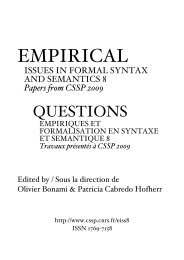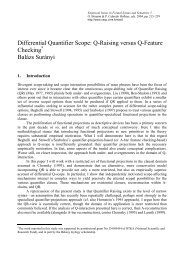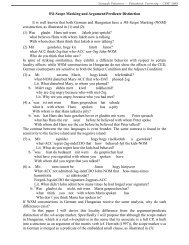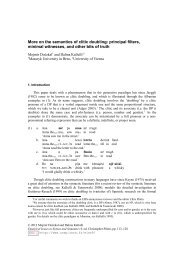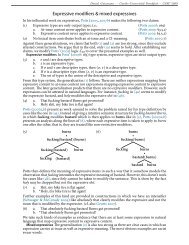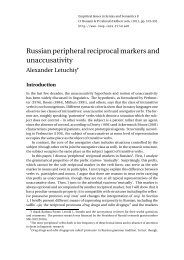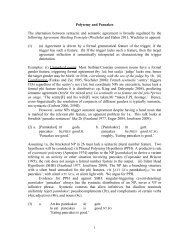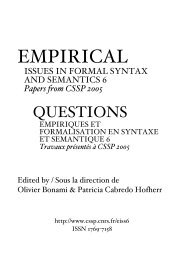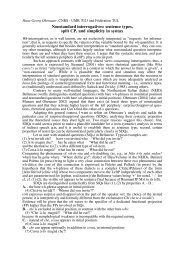Empirical Issues in Syntax and Semantics 9 (EISS 9 ... - CSSP - CNRS
Empirical Issues in Syntax and Semantics 9 (EISS 9 ... - CSSP - CNRS
Empirical Issues in Syntax and Semantics 9 (EISS 9 ... - CSSP - CNRS
Create successful ePaper yourself
Turn your PDF publications into a flip-book with our unique Google optimized e-Paper software.
The semantico-pragmatic condition holds <strong>in</strong> a certa<strong>in</strong> tense configuration, when the<br />
situation described by the complement <strong>and</strong> that described by the head clause overlap <strong>in</strong> time.<br />
This is aimed at <strong>in</strong>tegrat<strong>in</strong>g the futurate predicates (class (iv)) <strong>in</strong> the system: it is difficult to be<br />
committed to the truth of a proposition when it can only be realized <strong>in</strong> future time. Fortunately,<br />
these predicates are compatible with environments where the two situations overlap, so that the<br />
condition can be met. For <strong>in</strong>stance, <strong>in</strong> (24), the predicates evaluate a property of a situation<br />
which is concomitant with the judgment although it can only be verified <strong>in</strong> the future.<br />
(24) Nous avions {décidé / anticipé / promis} que le travail pouvait IND être fait en deux jours.<br />
Et nous nous étions trompés !<br />
We had decided / anticipated / promised that the job could be done <strong>in</strong> two days. And we<br />
were mistaken<br />
3.2. Condition on the subjunctive<br />
Broadly speak<strong>in</strong>g, the subjunctive mood is appropriate when the <strong>in</strong>terpretation requires<br />
tak<strong>in</strong>g <strong>in</strong>to account the possibility of non-p along with that of p. To <strong>in</strong>terpret a sentence such as<br />
Il est possible que Paul vienne ‘It is possible that Paul come’, with a subjunctive, one must take<br />
<strong>in</strong>to account situations <strong>in</strong> which Paul comes as well as situations <strong>in</strong> which Paul does not come.<br />
This is part of what the modal il est possible tells you. On the other h<strong>and</strong>, the <strong>in</strong>terpretation of a<br />
sentence such as Jean pense que Paul va venir ‘Jean th<strong>in</strong>ks that Paul will come’, with an<br />
<strong>in</strong>dicative, does not require that one take <strong>in</strong>to account situations <strong>in</strong> which Paul does not come.<br />
This is <strong>in</strong> essence the proposal <strong>in</strong> Farkas 1992, 2003 <strong>and</strong> Giorgi & Pianesi 1997. We return<br />
below to the def<strong>in</strong>ition of the condition. That such a condition is at work is evident with most of<br />
the predicates mentioned above as tak<strong>in</strong>g a subjunctive complement. It is <strong>in</strong>herent <strong>in</strong> the<br />
def<strong>in</strong>ition of modals (<strong>in</strong> a general way) (class (v)). With predicates of will <strong>and</strong> desire (class (via))<br />
<strong>and</strong> m<strong>and</strong>atives (class (vii-a)), the condition is met, s<strong>in</strong>ce the situation described <strong>in</strong> the<br />
complement does not obta<strong>in</strong>, <strong>and</strong> noth<strong>in</strong>g guarantees that the reality will conform to will or<br />
order. Negative predicates (class (vi-c)) differ from their positive counterparts <strong>in</strong> classes (i) <strong>and</strong><br />
(ii) precisely <strong>in</strong> that the <strong>in</strong>herent negation requires compar<strong>in</strong>g p <strong>and</strong> non-p (favor<strong>in</strong>g non-p)<br />
(class (vi-c)).<br />
Evaluatives (class (vi-b)) <strong>and</strong> causatives (class (vii-b)) deserve some comment. They have<br />
been a topic of <strong>in</strong>terest <strong>in</strong> the study of mood <strong>in</strong> complement clauses <strong>in</strong> Romance languages <strong>in</strong><br />
general (see <strong>in</strong> particular Farkas 1992, Quer 2001): they are evidence that the distribution of the<br />
moods cannot be assimilated to a broad dist<strong>in</strong>ction between realis (which would lead to<br />
<strong>in</strong>dicative) <strong>and</strong> irrealis (which would lead to subjunctive) environments. Some evaluatives are<br />
factives (regretter ‘to regret’, normal ‘normal’), <strong>and</strong> some causatives (réussir ‘succeed’,<br />
empêcher ‘prevent’) are implicatives; hence their complement describes a realis situation, yet<br />
they require the subjunctive. Similarly, they show that there is no simple solution <strong>in</strong> terms of<br />
the content types for complement clauses (G<strong>in</strong>zburg & Sag 2000). Predicates whose<br />
complement denotes an outcome certa<strong>in</strong>ly require the subjunctive (will <strong>and</strong> desire, m<strong>and</strong>atives<br />
<strong>and</strong> causatives), <strong>and</strong> the complement of predicates tak<strong>in</strong>g the <strong>in</strong>dicative denotes a proposition.<br />
However, the complement of evaluatives (normal), as well as negative attitudes (douteux), <strong>and</strong><br />
modals (possible), which also take a subjunctive complement, denotes a proposition, just like<br />
that of predicates tak<strong>in</strong>g an <strong>in</strong>dicative complement.<br />
The analysis for evaluatives is as follows: the evaluation itself supposes a comparison<br />
between p <strong>and</strong> non-p. Simply put, one cannot regret or be happy that some situation is the case,<br />
or judge that a situation is normal, without th<strong>in</strong>k<strong>in</strong>g that th<strong>in</strong>gs could have been different.<br />
Similarly with the non-factive predicates ‘dread’, ‘prefer’, ‘like’ etc. It is precisely the fact that<br />
136



